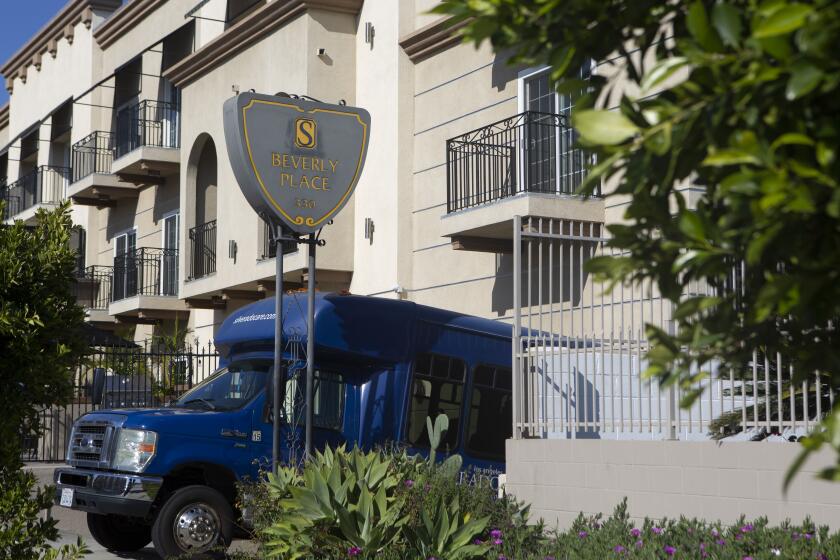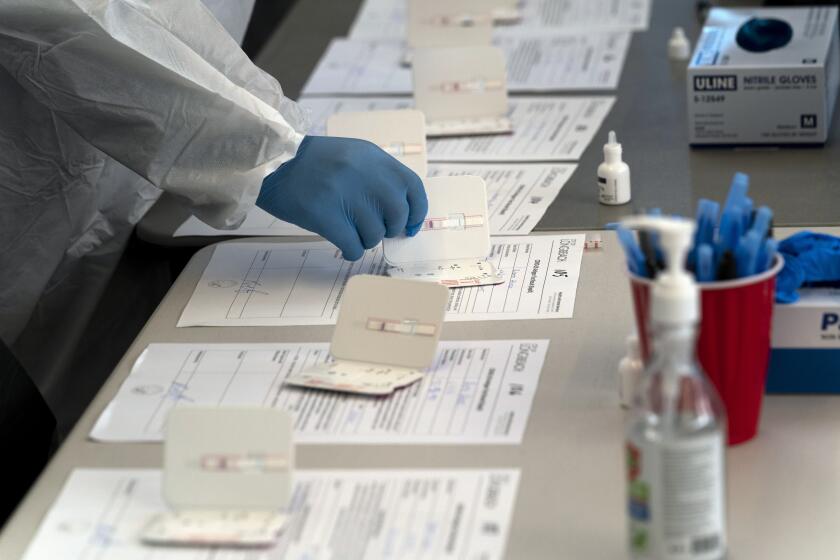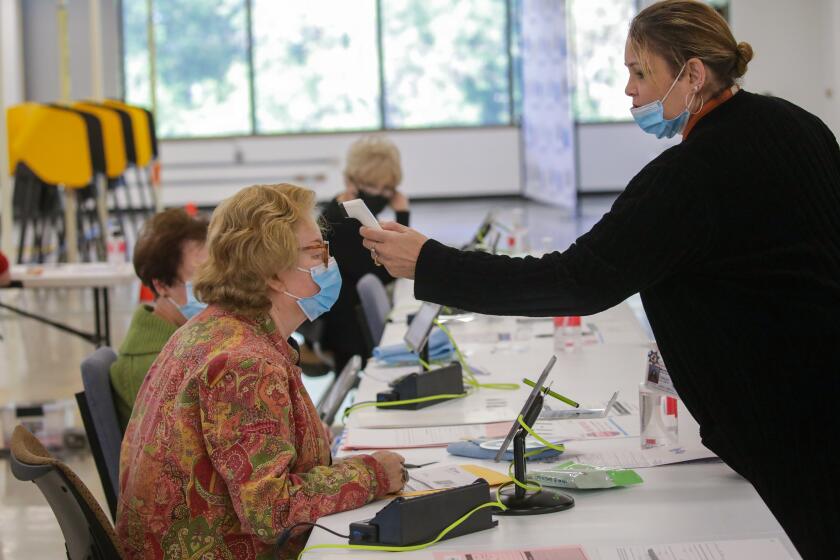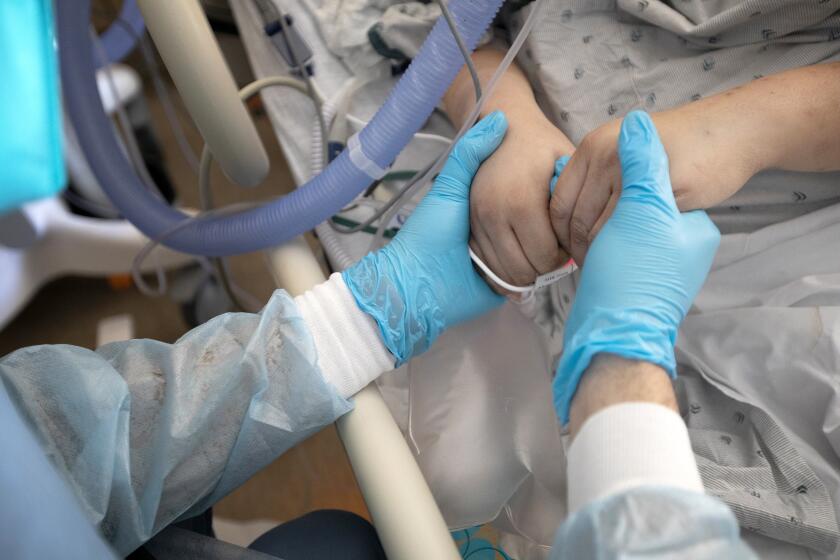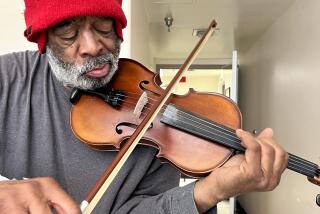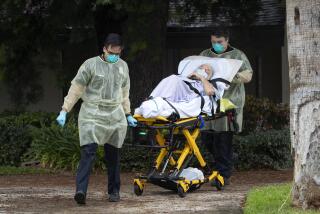Operators of upscale L.A. care facility charged in 14 COVID-19 deaths
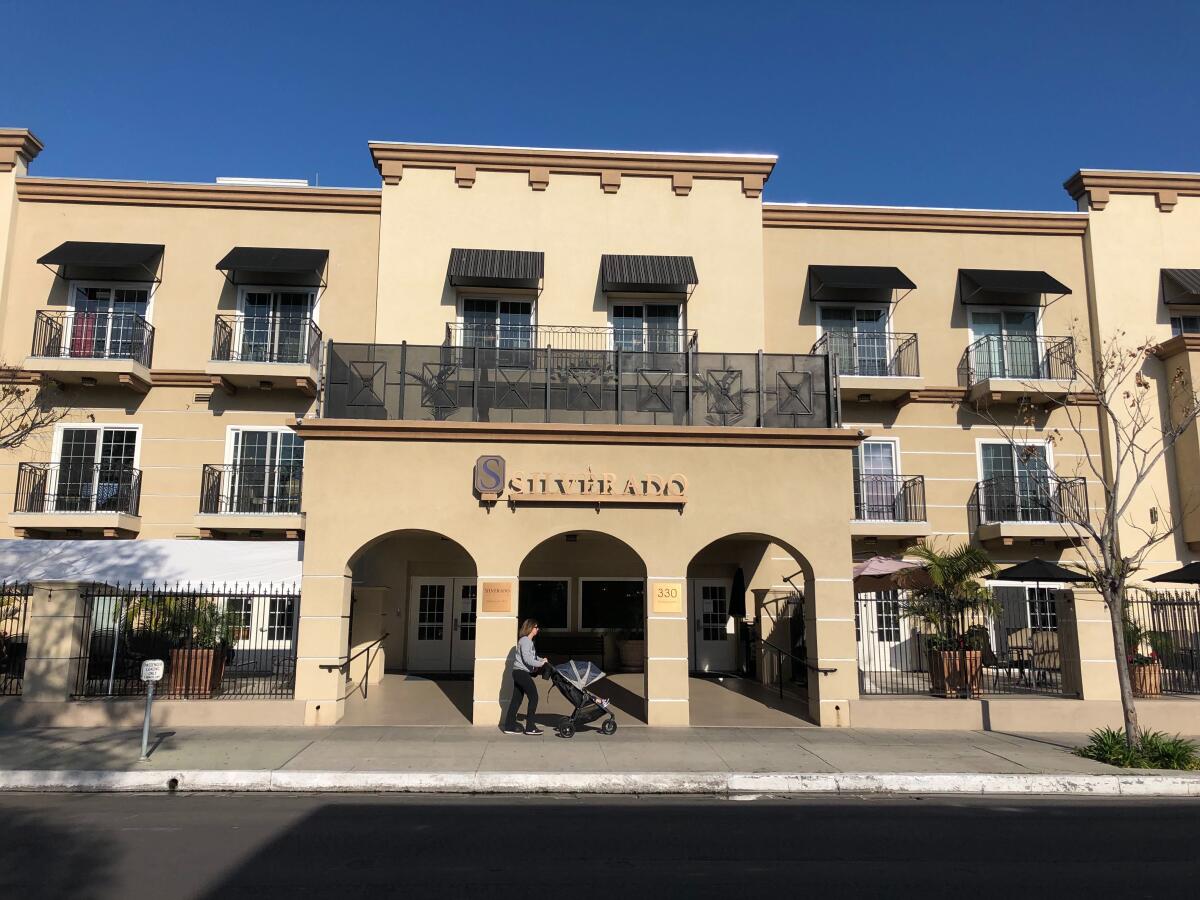
The operators of an upscale Los Angeles care facility for dementia patients were charged Tuesday with felony elder abuse and other criminal counts related to the deaths of an employee and 13 residents during the early days of the pandemic.
Silverado Beverly Place Memory Care Community, near the Fairfax district, specializes in caring for elderly residents with Alzheimer’s and dementia, and was the site of a COVID-19 outbreak in March 2020.
The employee and residents died during the outbreak, in which 45 employees and 60 residents were infected, according to the Los Angeles County district attorney’s office. The facility’s operators were sued in civil court by the families of multiple residents and the employee who died. The facility was the subject of a 2020 Times investigation.
The facility was meant to be closed to visitors, prosecutors said, when it admitted a patient from a New York psychiatric unit. Silverado Beverly Place’s own protocols required it to not admit anyone from a high-risk area like New York City, which was considered an epicenter of COVID-19 at the time.
A new resident at Silverado Beverly Place was hospitalized with coronavirus. Within 24 hours, another resident and an employee tested positive.
Prosecutors say the patient was not tested for the coronavirus when they were admitted and showed symptoms the next morning. But after they tested positive, they were not quarantined, according to the criminal charges.
Management at the facility did not block visitors who traveled domestically or internationally within 14 days to areas where COVID-19 cases were confirmed, prosecutors allege.
“These careless decisions created conditions that needlessly exposed Silverado staff and its residents to serious injury and — tragically — death,” Dist. Atty. George Gascón said in a statement.
Three managers were charged with 13 felony counts of elder endangerment and five felony counts of violation causing death. The latter charges were filed in connection with the facility’s management of its employee’s health and safety. Loren Bernard Shook, Jason Michael Russo and Kimberly Cheryl Butrum were charged along with the Irvine company Silverado Senior Living Management Inc.
Prosecutors say the patient from New York was admitted to Silverado Beverly Place because of financial considerations.
Most L.A. County residents who had long COVID reported symptoms severe enough to limit daily activities weeks after they were infected, a survey found.
Investigators with the California Division of Occupational Safety and Health conducted a two-and-a-half-year investigation into Silverado Beverly Place, whose parent company manages several care facilities across the country. Silverado Beverly Place was cited for violating the aerosol transmissible disease standard, which is meant to protect “employees who are at increased risk of contracting certain airborne infections due to their work activities,” according to Cal/OSHA.
The facility was cited $114,500 in proposed penalties for the violations but appealed the citations, according to a division spokesperson.
An email to Silverado Senior Living Management Inc. seeking comment on the charges was not immediately answered.
Gascón, during a news conference in downtown Los Angeles, also read the names of the 14 people who died. They are nurse Brittany Bruner-Ringo, Elizabeth Cohen, Joseph Manduke, Catherine Apothaker, Jake Khorsandi, Albert Sarnoff, Dolores Sarnoff, Myrna Frank, Frank Piumetti, Jay Tedeman, Luba Paz, Kaye Kiddoo, Richard Herman and Michael Horn.
Bruner-Ringo told her mother that the newly admitted patient was showing signs of illness — profuse sweating, a “productive” cough and a fever close to 103 degrees, her mother told The Times.
Relatives of residents and a nurse who died in a COVID-19 outbreak at a Westside home for dementia patients are suing the facility’s owner.
“I said, ‘Those are definitely problematic,’” recalled Kim Bruner-Ringo, a veteran nurse in Oklahoma City.
The patient was so ill that Brittany Bruner-Ringo called 911 for an ambulance, but it was too late. In the days and weeks that followed, the virus would spread in the facility.
Bruner-Ringo stopped breathing on April 20, 2020, in the intensive care unit at Harbor-UCLA Medical Center, according to her family. She was 32.
“I was just praying every day that Brittany would be able to tell her own story,” said her sister, Breanna Hurd.
Los Angeles criminal defense attorney Alan Eisner, who is not involved in the case, views the charges as unique because they deal with decisions made by managers of a senior care facility during the early days of the pandemic.
“This is a once-in-a-generation pandemic,” Eisner said. “I don’t want to disregard all the people who died. But that’s a high bar prosecutors have to prove and show that the facility is responsible for the deaths of all the other patients and even the nurse.”
Los Angeles County will end its COVID emergency declaration at the end of March, becoming the latest region to do so amid improving pandemic conditions.
Jody Moore, an attorney who represents seven clients who either became ill with COVID-19 or died while at Silverado, said by early 2020 the federal government provided guidance to long-term care facilities on how to safeguard elderly residents, including screening and testing policies.
“It doesn’t make any sense to say loved ones can’t come in, private caregivers can’t come in, because their documentation says we are putting residents at significant risk by exposing them to whatever may come through the front door,” Moore said. “What they allowed to come through the front door was somebody with dollars attached. And that’s what’s really egregious misconduct here.”
Helena Apothaker received an email from the facility in the early days of the pandemic letting her know that she would not be able to visit her mother, Catherine. The message said the facility was going into lockdown for the safety of its elderly residents.
“Nobody was allowed in,” Apothaker said in an interview with The Times. “They were going to keep our loved ones safe. That was their top priority. Well, not 30 days later, I guess they lost their top priority.”
Even in a time of plentiful vaccines and therapeutics, California is still tallying more than 20 COVID-19 deaths every day, on average.
Her mother was in the beginning stages of Alzheimer’s, but overall in good health, Apothaker said. After her mother tested positive for COVID-19, Apothaker placed her mother in hospice care and was finally allowed to visit in person.
“I was in the building with my mother for the week that she died,” Apothaker said. “I can’t imagine what it must have been like for everybody who had to watch their parents die through a window or watch their loved ones die over FaceTime.”
Hearing news that the criminal charges were filed against Silverado Beverly Place filled Apothaker with a sense of justice, because it feels as though people have forgotten about the pandemic and the people who have died.
“But I remember my mother died,” she said. “The only thing I had to hold on to was the idea that maybe one day I would get some justice.”
Times staff writer Harriet Ryan contributed to this report.
More to Read
Sign up for Essential California
The most important California stories and recommendations in your inbox every morning.
You may occasionally receive promotional content from the Los Angeles Times.
